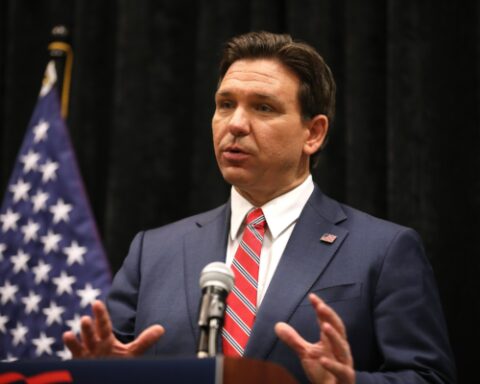In a significant move that has generated considerable backlash, Florida Governor Ron DeSantis announced his veto of a bipartisan bill aimed at reforming medical malpractice laws.
The legislation, known as HB 6017, sought to lift age restrictions on seeking uncapped non-economic damages in cases of medical negligence, a provision that has long been criticized by advocates for victims’ rights.
Under existing Florida law, adults over the age of 25 are prohibited from suing for non-economic damages on behalf of their parents if they die due to medical negligence.
Similar restrictions apply to parents of children who are older than 25. Supporters of the bill argued that this limitation unjustly denies families the right to pursue justice and compensation for their losses.
The legislation passed through both the state Senate and House of Representatives with more than 90% support, reflecting a strong bipartisan consensus on the issue.
At a news conference in Fort Myers, DeSantis expressed his reasons for the veto, asserting that the bill would have adverse consequences for the state’s healthcare system.
“If this legislation were enacted, it would lead to higher costs for Floridians and make it harder for us to retain physicians,” he stated.
DeSantis, alongside Florida Surgeon General Dr. Joseph Ladapo, contended that increased litigation could ultimately reduce access to healthcare for many residents.
The governor’s comments highlighted a broader concern among healthcare professionals regarding the potential impact of the bill on insurance costs and medical practice viability.
Both DeSantis and Ladapo advocated for a system that holds physicians accountable through regulatory measures rather than through litigation.
“It’s insane to have a system with no caps on non-economic damages,” Ladapo remarked, emphasizing the need for a balanced approach.
The veto has left many families devastated, particularly those who have faced the loss of a loved one due to medical negligence. Cindy Jenkins, a St. Augustine resident, expressed her dismay, recounting her personal struggle after her daughter’s passing shortly after her 25th birthday.
“I have been fighting this with everything I have since they killed my daughter,” Jenkins said, lamenting the lack of opportunity for justice.
As the political landscape shifts, some lawmakers are considering whether to attempt an override of DeSantis’s veto, though the path forward remains uncertain.
The dispute over HB 6017 reflects a larger national conversation about medical malpractice reform, the rights of victims, and the responsibilities of healthcare providers.
As Florida grapples with these complex issues, the ramifications of DeSantis’s decision will likely continue to resonate within the community, raising questions about the balance between patient rights and the healthcare system’s sustainability.
The conversation around medical malpractice reform in Florida is far from over, as advocates and policymakers navigate the intricate landscape of healthcare legislation.
[READ MORE: Jake Tapper Blasts ‘Problematic’ Lawfare Waged Against Trump by Liberals]








